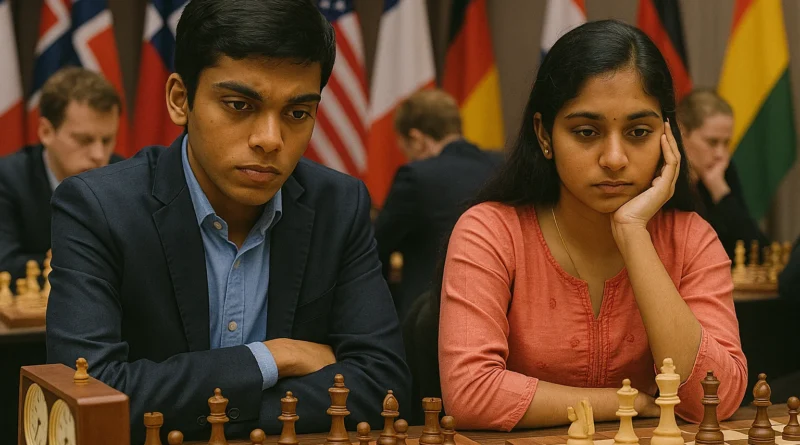Spotlight on Discrimination: Indian and Female Chess Players Face Uphill Battle in Global Arena
GLOBAL CHESS CIRCUIT – July 1, 2025 – While Indian chess continues its meteoric rise on the international stage, with prodigies like D. Gukesh, R. Praggnanandhaa, and Arjun Erigaisi making headlines, recent incidents and ongoing systemic issues are casting a shadow on the sport, highlighting concerns about discrimination faced by both Indian and female chess players.
Indian Grandmasters: Online Abuse and Systemic Hurdles
The recent Norway Chess 2025 tournament brought to light an unfortunate aspect of the competitive chess world. Following Indian Grandmaster D. Gukesh’s significant victory over World Champion Magnus Carlsen, Gukesh reportedly faced an “outburst” from Carlsen, followed by a barrage of racist comments directed at him on social media. The organizers of Norway Chess were quick to condemn these online attacks, emphasizing their commitment to a respectful environment. Carlsen later apologized for his reaction, attributing it to the heat of the moment.
While there is no direct evidence of top players like Carlsen, Fabiano Caruana, or Hikaru Nakamura actively discriminating against Indian male players in their professional interactions, the incident highlights a disturbing trend of online abuse. In fact, Carlsen and Nakamura have publicly praised Praggnanandhaa, welcoming him to Team Liquid, an esports organization. Praggnanandhaa himself has stated that he is not “really hurt” by some critical remarks, focusing on willpower and character in high-stakes matches.
However, Indian chess players, in general, face a unique set of systemic challenges. Many are considered “underrated” on the global circuit due to a relative scarcity of high-rated tournaments within India, which makes it difficult to consistently improve their FIDE ratings and secure Grandmaster norms. This often necessitates expensive travel abroad to compete, adding a significant financial burden. There’s also a psychological barrier where players fear losing rating points against lower-rated opponents, impacting their willingness to compete in certain domestic events.
The Enduring Struggle of Female Chess Players
The challenges faced by female chess players are even more deeply entrenched, pointing to a broader gender bias within the sport. Studies, including one from NYU co-authored by two-time U.S. Women’s Champion Jennifer Shahade, indicate a pervasive bias where parents and coaches often underestimate the potential of young girls in chess compared to boys. This perception contributes significantly to a higher dropout rate among female players as they grow older.
Beyond subtle biases, female players frequently encounter unequal treatment. Prize money in women’s tournaments is often considerably lower than in open tournaments, despite comparable levels of skill and effort. There’s also an “unspoken bias” in open tournaments, where male opponents sometimes perceive a pairing against a woman as an easier win, leading to a lack of respect or a dismissive attitude.
More alarmingly, instances of harassment and sexual misconduct against female chess players have surfaced, with accusations against prominent figures in the chess world and concerns about the slow response of governing bodies. An open letter from French female chess players explicitly denounced “sexist or sexual violence” they had experienced, linking it to the high attrition rate of women and young girls in the sport.
Despite calls from some quarters to abolish women’s-only tournaments, many prominent voices argue that these events remain crucial. They provide a supportive and safe environment, offer vital funding opportunities for professional careers, and help nurture a community for female players in a predominantly male-dominated field.
As chess gains increasing global popularity, particularly with the rise of young talents from diverse backgrounds, the sport faces a critical juncture. Addressing these forms of discrimination—be it online racism, systemic rating challenges, gender bias, or harassment—is paramount to ensuring a truly inclusive and equitable future for all who aspire to master the game.

